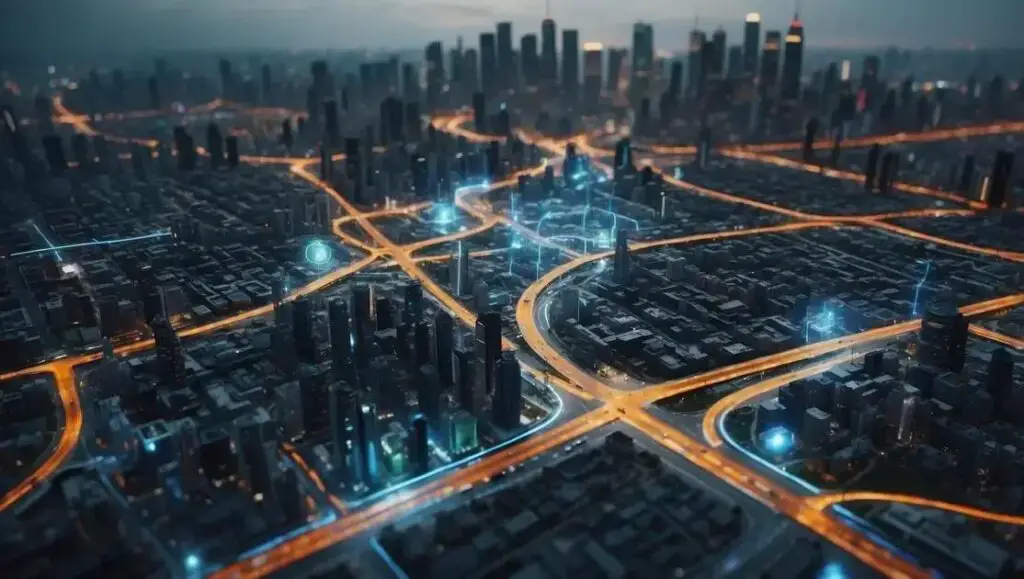GPS impact is evident in our daily lives, transforming how we navigate and interact with the world. This technology has revolutionized transportation, making travel more efficient and accurate. In this article, we delve into the multifaceted ways in which GPS technology impacts everything from personal navigation to large-scale logistics, offering insights into its historical development, economic implications, and future trends.
Table of Contents
ToggleUnderstanding GPS Technology
Understanding GPS technology is vital for comprehending its impact on modern navigation systems. GPS, or Global Positioning System, uses a network of satellites to provide accurate location data. These satellites orbit the Earth, sending signals to GPS receivers, which calculate the user’s exact position based on the time it takes for signals to travel from the satellites to the receiver.
How GPS Works
The system consists of three main components: satellites, ground control stations, and GPS receivers. The satellites continuously transmit their location and time data as radio signals. The ground control stations monitor these satellites, ensuring they are functioning correctly and their positions are accurate. Finally, GPS receivers, found in smartphones, cars, and other devices, collect these signals to compute location.
Accuracy and Limitations
Most modern GPS devices can locate a position with an accuracy of within a few meters. However, various factors can influence performance, such as atmospheric conditions, signal blockage from buildings or trees, and multipath effects where signals bounce off surfaces.
Applications of GPS Technology
GPS technology has a wide range of applications, including navigation, sector tracking, and even disaster management. In navigation, it helps users find their way, avoids traffic, and identifies nearby points of interest. In agriculture, GPS aids in efficient field mapping and crop management, while in emergency services, it allows for quicker response times.
In summary, understanding GPS technology offers insights into how it revolutionizes navigation and everyday life, enhancing safety, efficiency, and convenience.
The Historical Development of GPS
The historical development of GPS spans several decades and reflects significant advancements in technology and military needs. The concept of satellite navigation began in the 1950s when the U.S. military recognized the potential of using satellites for navigation purposes. The first operational satellite, Transit 1B, was launched in 1960, marking a pivotal moment in navigation technology.
Early Development and Applications
The TRANSIT system was primarily used for maritime navigation, helping submarines and ships track their positions accurately. This innovative system relied on the Doppler effect to calculate location. However, its limitations, particularly regarding accuracy and global coverage, prompted the search for more advanced solutions.
Advancements in Military Navigation
In the 1970s, the U.S. Department of Defense initiated the GPS program to create a more reliable and accurate global positioning system. The satellite constellation was designed to provide continuous coverage for military and civilian use. By the late 1980s, the first GPS satellites were fully operational, offering positioning services to users around the globe.
The Role of Civilian GPS
In 1996, GPS was made available for civilian use, expanding its applications significantly. The accuracy improved with the introduction of the Selective Availability feature, which was turned off in 2000, allowing everyone to benefit from enhanced positional accuracy.
Recent Developments
Since then, GPS technology has evolved exponentially. Innovations like multi-constellation systems and advanced algorithms have improved accuracy and reliability. The introduction of devices such as smartphones has made GPS an integral part of daily life, influencing various sectors, including transportation, agriculture, and emergency services.
Today, GPS functions seamlessly in various applications, demonstrating the importance of its historical development in shaping modern navigation.
How GPS Impacted Navigation
How GPS impacted navigation has been transformative, reshaping how individuals travel and find their way. Prior to the advent of GPS, navigation relied heavily on paper maps and traditional methods, which often involved estimating distance and direction.
Enhancing Accuracy
With the introduction of GPS, users can now obtain precise location data in real time. This accuracy, often within a few meters, allows for more reliable navigation, which is critical for both personal travel and commercial transportation.
Convenience of Turn-by-Turn Directions
GPS technology provides turn-by-turn directions, simplifying the navigation process. Users no longer need to stop and refer to a map or ask for directions; instead, they receive spoken instructions that guide them along their route.
Integration with Mobile Devices
The integration of GPS into smartphones has made navigation easily accessible to everyone. Users can now navigate anywhere at any time, transforming mobile devices into essential navigation tools.
Impact on Various Industries
Different industries benefit from GPS in unique ways. For example, logistics companies can track fleet movements in real time, improving efficiency and reducing costs. Similarly, the emergency services rely on GPS to respond swiftly to incidents, enhancing public safety.
Cultural Shift in Navigation
GPS has caused a cultural shift in how people orient themselves. Many have become dependent on electronic navigation systems, which can sometimes reduce traditional map-reading skills. This dependency raises concerns about navigation capabilities during GPS outages or failures.
Overall, the impact of GPS on navigation is profound, offering enhanced accuracy, convenience, and functionality that has changed how people navigate the world.
The Economic Benefits of GPS
The economic benefits of GPS are significant and multifaceted, impacting various sectors of the global economy. This technology has transformed not only transportation but also logistics, agriculture, and emergency services.
Efficiency in Logistics
One of the primary economic advantages is the improved efficiency in logistics and supply chain management. Companies can track their fleets in real time, optimizing routes and reducing fuel costs. This leads to savings that can be redirected toward growth and innovation.
Enhanced Productivity
GPS technology allows businesses to monitor employee productivity. For instance, field service companies can schedule appointments more effectively, ensuring that technicians spend less time driving and more time working. This translates into increased output and revenues.
Impact on Agriculture
Agriculture has also seen economic benefits from GPS. Farmers can utilize precision agriculture techniques to manage crops better and maximize yields. By analyzing data from GPS systems, they can make informed decisions about planting, watering, and harvesting, leading to higher profits and lower waste.
Improved Safety and Response Times
In emergency services, GPS enhances safety and response times, which can save lives and reduce costs. First responders can swiftly navigate to incidents, improving service delivery and decreasing insurance and liability costs for municipalities.
Tourism and Hospitality Growth
Moreover, the hospitality and tourism industries have benefited from GPS technology. Tourists rely on GPS-enabled devices for navigation, discovering attractions, and planning their trips. This convenience supports local economies by directing visitors to businesses and services.
Overall, the economic benefits of GPS are profound, fostering growth, efficiency, and innovation across numerous sectors, which ultimately contributes to the broader economy.
GPS in Everyday Life
GPS in everyday life plays a crucial role in how people navigate their world. From commuting to work, finding restaurants, to tracking fitness activities, GPS technology is embedded in our daily routines.
Commuting Made Easy
For many, GPS applications like Google Maps or Waze have become indispensable tools for driving. They provide real-time traffic updates, suggest alternate routes, and even give estimated arrival times. This convenience helps users avoid traffic jams and reduces travel time.
Finding Local Businesses
GPS assists individuals in discovering local businesses, like coffee shops and grocery stores. Many mobile apps utilize GPS to help users locate nearby services, read reviews, and even make reservations. This accessibility has transformed how consumers interact with local markets.
Fitness and Health Tracking
For fitness enthusiasts, GPS watches and smartphone apps are vital for tracking workouts. Users can monitor their running or cycling routes, measure distance, and log their progress. This data encourages a healthy lifestyle by helping individuals set and reach fitness goals.
Travel and Exploration
Travelers benefit from GPS when exploring new places. GPS-enabled devices guide tourists to attractions, accommodations, and events, making travel more enjoyable and less stressful. They also enhance safety by providing directions in unfamiliar areas.
Emergency Situations
In emergencies, GPS is critical for locating people quickly. Emergency services can use GPS data to find individuals in distress and respond more efficiently. This technology can save lives by reducing response times.
Overall, GPS technology is an integral part of everyday life, making navigation easier, enhancing safety, and contributing to personal well-being.
GPS and Location-Based Services
GPS and location-based services have revolutionized how businesses interact with consumers. These services leverage GPS technology to provide tailored experiences based on a user’s geographical location, enhancing convenience and accessibility.
Understanding Location-Based Services
Location-based services (LBS) utilize GPS data to offer services and information depending on where a user is situated. This includes map navigation, local business searches, and targeted marketing. With LBS, businesses can connect with potential customers in real-time.
Examples of LBS in Action
Many mobile apps integrate GPS for location-based services. Applications like Uber use GPS to connect riders with drivers, ensuring efficient pickup and routes. Similarly, restaurant delivery services like DoorDash rely on LBS for precise address mapping.
Benefits for Businesses
Businesses benefit significantly from GPS and location-based services. They can send targeted promotions to customers when they are nearby, increasing foot traffic. This strategy helps businesses leverage their proximity to attract local clientele effectively.
Enhanced User Experience
For consumers, GPS and LBS create a more personalized experience. Users can receive recommendations, find deals, and navigate to nearby attractions seamlessly. This personalization fosters customer loyalty and satisfaction.
Privacy and Ethical Considerations
While the advantages are clear, GPS and location-based services also raise privacy concerns. Users must understand how their data is collected and used. Striking a balance between personalization and privacy is essential for service providers.
In summary, integrating GPS and location-based services offers vast opportunities for both businesses and users, improving interactions and enhancing accessibility through technology.
Future Trends in GPS Technology
Future trends in GPS technology will continue to shape how we navigate our world. As technology evolves, we can expect significant advancements that will enhance accuracy, accessibility, and applications of GPS.
Increased Accuracy with Advanced Systems
One major trend is the development of advanced GPS systems that offer improved accuracy. New technologies, such as multi-frequency GPS, will allow users to achieve pinpoint precision in various environments, such as urban canyons and densely wooded areas.
Integration with IoT and Smart Devices
Integration with the Internet of Things (IoT) is another exciting trend. GPS technology will increasingly connect with smart devices, allowing seamless tracking of everything from vehicles to personal belongings. This integration can enhance services like location-based marketing and smart city developments.
Advancements in Augmented Reality (AR)
Augmented reality applications will leverage GPS technology to enhance user experiences. For example, AR navigation will provide real-time directions overlaid onto the physical world through smartphones or AR glasses, making navigation more intuitive.
Enhanced Security Features
As GPS technology becomes more prevalent, enhanced security features will be critical. Innovations in encryption and data protection will help maintain user privacy and ensure safe communication between devices.
Application in Autonomous Vehicles
Finally, GPS will play a vital role in the rise of autonomous vehicles. The ability of these vehicles to navigate without human intervention relies heavily on accurate and reliable GPS data. Future developments in GPS technology will support safer and more efficient self-driving cars.
Overall, the future of GPS technology is bright, marked by innovations that will enhance navigation and improve the way we interact with our environment.
Challenges Facing GPS Technology
Challenges facing GPS technology include various technical, environmental, and security issues that can impact its performance and reliability. Understanding these challenges is essential for users and developers of GPS systems.
Signal Blockage
One of the main challenges is signal blockage. GPS signals can be obstructed by tall buildings, mountains, and dense urban areas. This can lead to inaccurate readings or loss of signal altogether, making navigation difficult in certain environments.
Atmospheric Interference
Atmospheric conditions can also affect GPS accuracy. Changes in the ionosphere and troposphere can introduce delays in the GPS signals, leading to reduced precision. Weather phenomena such as storms can further complicate this issue.
Dependence on Satellite Systems
The dependence on satellite systems for GPS navigation is another challenge. Any systemic failure, like a malfunctioning satellite, can disrupt the entire network. While there are backup systems, they may not always be fully reliable.
Vulnerability to Jamming and Spoofing
GPS technology is vulnerable to jamming and spoofing attacks. Jamming is intentional interference that disrupts GPS signals, while spoofing involves broadcasting false signals to mislead GPS receivers. Both can compromise safety and security.
Privacy Concerns
With the widespread use of GPS in mobile devices, privacy concerns emerge. Users are often unaware of how their location data is collected and used, raising questions about data security and user consent.
While GPS technology continues to evolve, these challenges must be addressed to enhance reliability and user confidence in navigation systems.
GPS Impact on Safety and Security
GPS impact on safety and security is significant across various sectors, enhancing both personal safety and broader security measures. GPS technology has transformed how emergency services respond to incidents and how people navigate safely.
Emergency Response Improvements
One of the key impacts of GPS is on emergency response systems. First responders can use GPS to locate individuals in distress swiftly. This technology allows dispatchers to navigate to the exact location, minimizing response times and potentially saving lives.
Mapping and Surveillance
In terms of public safety, GPS helps law enforcement agencies track vehicles and monitor criminal activity. This mapping improves community safety by enabling quick responses to incidents and allowing for strategic patrol planning.
Personal Safety Applications
GPS also plays a critical role in personal safety. Many mobile applications allow users to share their location with trusted contacts. This feature enhances safety during travel by letting friends and family know where you are, providing an added layer of security.
Asset Tracking
Beyond personal safety, GPS is widely used for asset tracking. Many businesses equip their vehicles and high-value assets with GPS tracking devices. This not only helps in preventing theft but also in monitoring movements, ensuring assets are secure.
Challenges in Security
While GPS enhances safety, it is not without challenges. The reliance on GPS makes systems vulnerable to hacking, jamming, and spoofing. These security risks can undermine the reliability of GPS-based applications in safety-sensitive areas.
Overall, the impact of GPS technology on safety and security is profound, providing tools that improve emergency response, personal safety, and asset management while highlighting the necessity for robust security measures.
In Conclusion: The Transformative Power of GPS Technology
The impact of GPS technology is substantial across numerous aspects of modern life, from navigation and economic benefits to safety and security enhancements. As observed, GPS has revolutionized how we commute, discover local businesses, and even engage in fitness activities.
Furthermore, the integration of GPS with location-based services has opened new avenues for businesses to interact with customers effectively. However, it is essential to recognize and address the challenges that GPS technology faces, including environmental factors, security vulnerabilities, and privacy concerns.
Looking ahead, the future of GPS technology promises exciting advancements, with increased accuracy and integration with IoT devices poised to further enhance user experiences. As technology continues to evolve, the importance of GPS in everyday life and various industries cannot be overstated.
In summary, the ongoing developments in GPS technology will undoubtedly shape the way we navigate our world, ensuring that safety, efficiency, and convenience remain at the forefront of our technological interactions.
FAQ – Frequently Asked Questions About GPS Technology
How does GPS impact our daily lives?
GPS plays a crucial role in navigation, helping individuals find routes and locate businesses, enhancing convenience in daily activities.
What are the economic benefits of GPS?
GPS improves efficiency in logistics, increases productivity in various industries, and helps businesses attract local customers through location-based services.
What safety improvements does GPS provide?
GPS enhances safety by improving emergency response times, allowing first responders to quickly locate individuals in distress and ensuring public security.
What challenges does GPS technology face?
GPS faces challenges such as signal blockage, atmospheric interference, and vulnerabilities to jamming and spoofing attacks, which can affect reliability.
How will GPS technology evolve in the future?
Future trends include increased accuracy with multi-frequency systems, integration with IoT devices, and innovative applications in augmented reality and autonomous vehicles.
Are there privacy concerns associated with GPS?
Yes, GPS usage raises privacy issues regarding data collection and user consent, making it essential for companies to be transparent about their practices.











